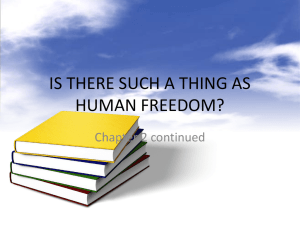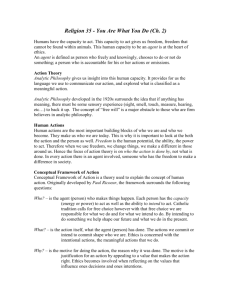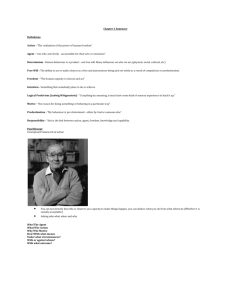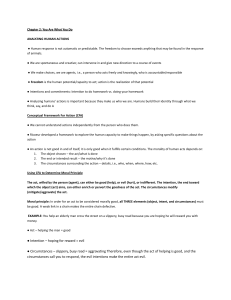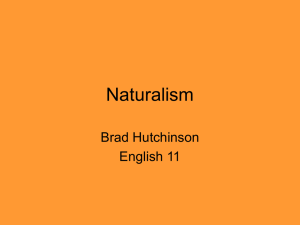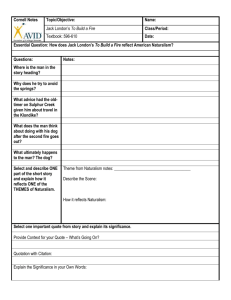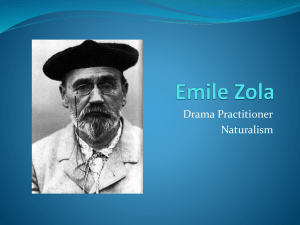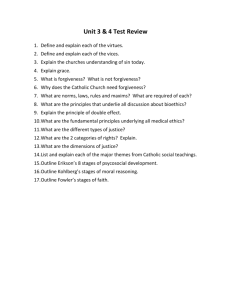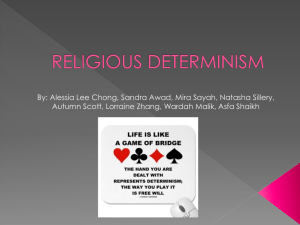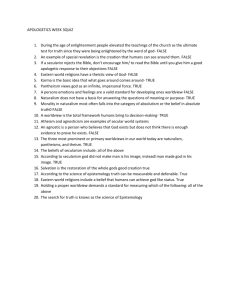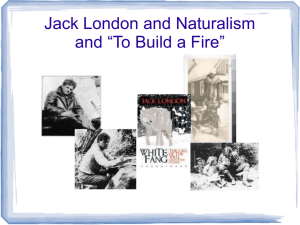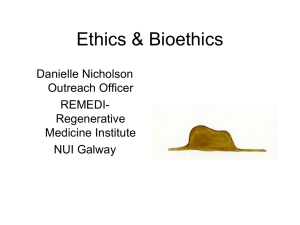Key Thinkers
advertisement
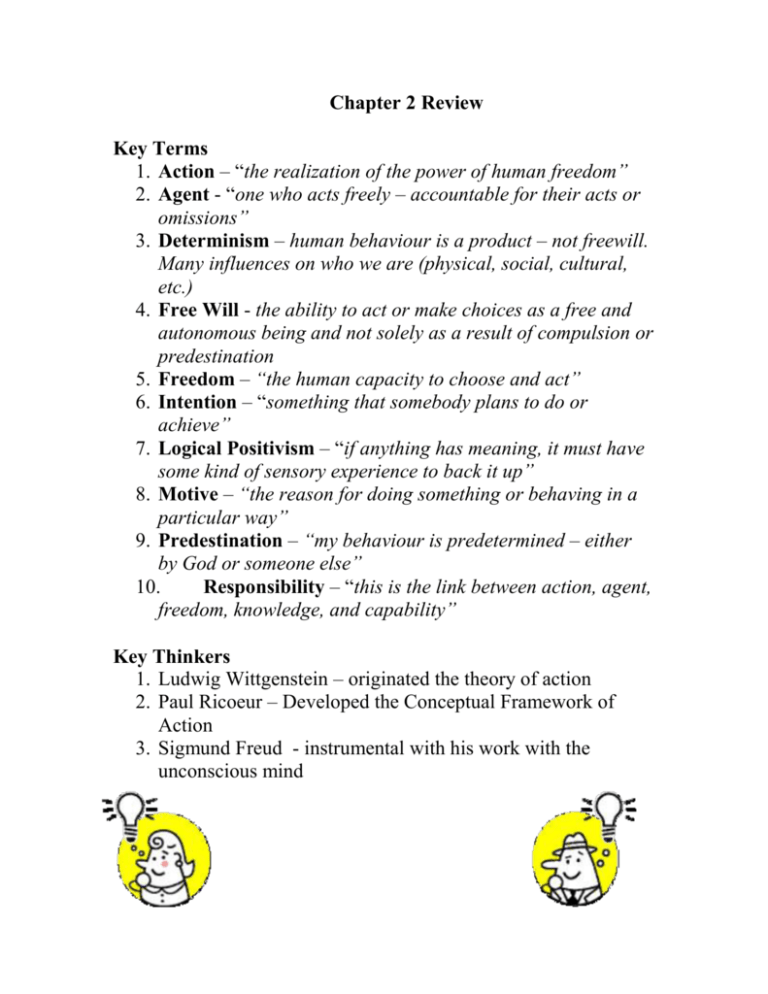
Chapter 2 Review Key Terms 1. Action – “the realization of the power of human freedom” 2. Agent - “one who acts freely – accountable for their acts or omissions” 3. Determinism – human behaviour is a product – not freewill. Many influences on who we are (physical, social, cultural, etc.) 4. Free Will - the ability to act or make choices as a free and autonomous being and not solely as a result of compulsion or predestination 5. Freedom – “the human capacity to choose and act” 6. Intention – “something that somebody plans to do or achieve” 7. Logical Positivism – “if anything has meaning, it must have some kind of sensory experience to back it up” 8. Motive – “the reason for doing something or behaving in a particular way” 9. Predestination – “my behaviour is predetermined – either by God or someone else” 10. Responsibility – “this is the link between action, agent, freedom, knowledge, and capability” Key Thinkers 1. Ludwig Wittgenstein – originated the theory of action 2. Paul Ricoeur – Developed the Conceptual Framework of Action 3. Sigmund Freud - instrumental with his work with the unconscious mind Action Theory – 1. actions are what makes us human – gives us identity (think, say, do) 2. more important to focus on who the action is done by – not the action itself Conceptual Framework of Action 1. Developed by Paul Ricoeur 2. who (agent), what (action), why, how, with/against whom, circumstances, outcome – questions posed by the Conceptual Framework of Action 3. meaning of an action depends on the answers to these questions 4. the morality of human acts depends on: a. the object chosen b. the intention c. the circumstance of the action Naturalism – 1. science reigns supreme 2. we are a product of our genetic history and not an intending self 3. all decisions do not come from motives and intentions, but from a genetic predisposition – therefore, no free will 4. Naturalism denies the possibility of ethics and morality Therefore, Naturalism can’t account for human freedom or the moral drive. Naturalism and Artificial Intelligence – “With A. I., you can model an aspect of intelligence, but you can’t replicate the intelligent system” – Amanda Sharkey, Sheffield University Both have interests in the human brain & its neural networks Both consider: “But what if you are not the agent? What if your identity is nothing more than neural connections?” The Mind-Brain Distinction – (Rene Descartes was perhaps the first to argue the distinction between the two) If we simply conclude that the human mind is nothing more than the brain at work we would have to say that all of our actions are only products of brain activity & have nothing to do with the freedom to choose There is a difference between them a. Brain – helps with the functioning of the body. If it becomes damaged, it incapacitates an individual’s development b. Mind – i. at the heart of human capacity ii. provides freedom, choice, action iii. to understand things that neural physiology can’t (God’s self revelation in faith, hope, love) Religious Determinism – 1. “some churches within Christianity have denied human freedom” predestination 2. they believe that God has predetermined everything 3. providence – God’s influence upon events and actions. 4. Catholic teachings – human freedom and God’s providence do not conflict (God’s love needs & makes possible our cooperation) 5. humans are free because of God’s providence 6. God’s goal is salvation … however, our free choice dictates and allows us to either cooperate, or not Social Determinism – 1. similar to naturalism (no free will) 2. behaviour is determined by your influences in life (parents, culture, psychological state, race, gender, etc …) 3. you are not free because of what others have done to you – your past determines who you are 4. you can’t be held responsible for anything you do 5. according to Freud, the unconscious mind is always pressuring the conscious mind 6. neurotic behaviour is past experiences coming to life 7. Freud’s life (love)/death instinct. (read p.36-37in textbook) Again, influences around you that don’t allow you to make a free choice. Within Christian tradition, freedom is an essential characteristic of human nature. St. Augustine was the first to name the human will. You can make promises, commitments and choices. These actions form who you are becoming. Freedom: The Amazing Capacity to Act Chapter 1 1. Our desire for the good (Aristotle’s teleological view) 2. Ethics of obligation and duty (Kant’s deontological view) 3. The face of an other (Levinas’s relational theory of ethics) The Conceptual Framework of Human Action Who? The agent (you act freely – free choice – you are responsible for what you intend to do eg: university – so, you study hard … intention is there) What? The action – what the agent does (your actions shape you. Ethics doesn’t worry about unintentional actions (sneezing, sleepwalking), but intentional or meaningful actions.) Why? The motive (a reason for the action – you want to be a lawyer – uni) How? With what means? (how you react shows who you are) Under what circumstances? – these can aggravate or enhance your actions With whom or against whom? Again, these tell who you are With what outcome? The outcome of your actions – intended or not – clearly affects the self for good or bad. The morality of human acts depends on: 1. the action chosen 2. the intention 3. the circumstances of the action Q: Then, what is the ca Human response is predictable. We have the capaci Action Theory Analytic philosop insight into the h something It examines the la communicate our what constitutes a Actions are not e own Freedom is the hu capacity, the pow Action is the reali When you use yo changes – you ch events So, it is not what is done by. Human action is Ethics examines individual to ma your world, in y even within your
